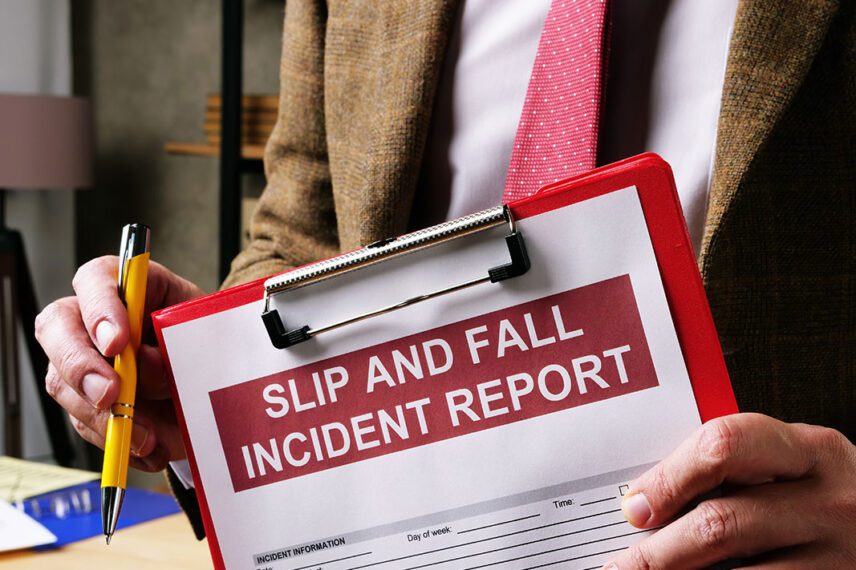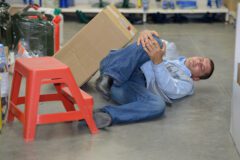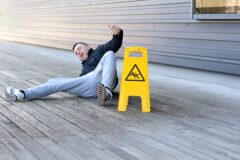Who Can a Slip-and-Fall Claim?

Suppose you were walking through the yard of a business to take a shortcut to the door, and suddenly, you fall into a 3-foot hole, breaking a leg. Is it your fault or the property owner’s fault? In South Carolina, that depends on premises liability law which states that if you’re injured on someone else’s property, it is the owner’s fault—if they have failed to appropriately maintain their property to ensure it is safe for guests, employees, and visitors.
A failure to maintain their land would fall under the realm of negligence, and victims of this negligence are eligible to file suit over any injuries sustained because of it. Other types of premises liability claims other than slip-and-fall accidents include dog bites, pool incidents, and other injuries caused by dangerous conditions of the property.
What You Must Prove in a Slip-and-Fall Claim
To receive compensation for a slip-and-fall claim, you must show proof of several things, including:
- That the defendant owed you a duty of care
- That the defendant’s breach of their duty of care was due to negligence or omission
- That you suffered damages as a result of their breach of duty
However, under the common law principles, the duty of care that the property owner owes the victim of the accident depends upon the victim’s legal status, especially their legal status in the context of their time spent on the owner’s property. This status will affect the duty that the property owner owes to the victim.
What Are the Types of Legal Status a Victim May Have?
Common law principles classify the legal status of a victim based on the following four types:
Adult Trespassers
These people illegally enter the property owner’s land or do not have their express permission to enter it.
Invitees
Invitees are guests of the business that have been invited to enter the premises. Invitees are expected to experience safe and protected premises free from unreasonable risks. This can include people such as hotel guests, who are considered to be owed the highest level of duty.
Licensees
These are essentially secondhand guests of the establishments (i.e. they were invited as a plus one by an invitee). Licensees are expected to be adequately warned by the property owner of any dangerous conditions that may not be easily noticeable.
Children
Children are expected to be kept safe from dangerous conditions. However, because not all children have the same cognition level, laws may vary as to the general duty of care owed by the property owner.
What Do I Need to Prove Liability in a Slip-and-Fall?
When trying to prove that a property owner is liable for a slip-and-fall accident, you will need to collect as much evidence as possible surrounding the incident, including things like:
- Photos of the scene of the incident
- Photos of the surrounding property that may prove further negligence
- Photos of any injuries
- Eyewitness information, including any recording of any statements of the incident and their contact information
- Copies of the official incident injury report you filed with the business
- Medical records
- Proof of lost wages
How Can a Lawyer Help My Case?
A premises liability lawyer can help you collect evidence surrounding the incident and ensure all paperwork is filed on time. Additionally, negotiating a settlement deal with the insurance company can prove tricky, as scrupulous insurers are only interested in protecting their own profits and will often lowball you into settling for less money than your claim is actually worth. A skilled lawyer will fight for your side and make sure that you only accept the best offer of compensation, navigating through the tricky tactics that insurers will try to use.
Conclusion
Proving a slip-and-fall accident can be difficult, so it’s crucial to understand when you have a viable case worth fighting for. It must be shown that the property owner breached their duty of care to an invitee, a licensee, or in some instances, a child through negligence or omission. Collecting as much evidence as possible helps to legitimize your case and prove the property owner was liable.
Even with solid evidence, it’s not always easy to hold the guilty party accountable for the damages they have caused. Hiring an experienced personal injury attorney gives you a far better chance of maximizing your settlement and holding the property owner responsible.






